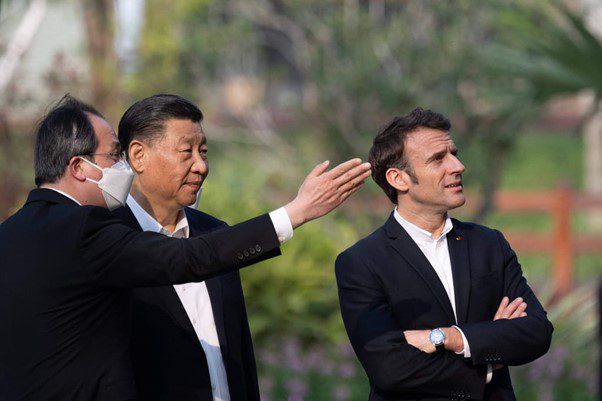On his return to Paris, Macron advised his European counterparts to reduce dependency on the United States and avoid getting dragged into a confrontation between China and the U.S. over Taiwan. It is perhaps a matter of time before Macron’s call for strategic autonomy i.e. European strategy independent of the U.S. influence, finds resonance with major European countries.
Following a six-hour-long meeting with Chinese President Xi Jinping in Beijing in April of this year, French President Emmanuel Macron mentioned things that major European countries did not like:
On his return to Paris, Macron advised his European counterparts to reduce dependency on the United States and avoid getting dragged into a confrontation between China and the U.S. over Taiwan.
Why did he say so? Because he seems to be conscious of the risks of taking sides in external wars.
“The great risk” Europe faces is that it “gets caught up in crises that are not ours, which prevents it from building its strategic autonomy. The question Europeans need to answer … is it in our interest to accelerate [a crisis] in Taiwan? No. The worse thing would be to think that we Europeans must become followers on this topic and take our cue from the U.S. agenda and a Chinese overreaction,” Macron said.
“The paradox would be that, overcome with panic, we believe we are just America’s followers,” Macron said in the interview.
Macron and Xi discussed Taiwan “intensely,” according to French officials accompanying the president, who appears to have taken a more conciliatory approach than the U.S. and even the European Union.
Beijing claims Taiwan as its integral part and expects other countries to recognize it as part of “one China.” That is why President Xi Jinping and other Chinese Communist Party have enthusiastically endorsed Macron’s concept of strategic autonomy.
“If the tensions between the two superpowers heat up … we won’t have the time nor the resources to finance our strategic autonomy and we will become vassals,” he said, probably taking a cue from President Xi who reportedly dismissed foreign influence as far as China’s position on Taiwan is concerned.
Macron also highlighted the limitations of major European countries in terms of geo-politically driven conflicts.
“Europeans cannot resolve the crisis in Ukraine; how can we credibly say on Taiwan, ‘watch out, if you do something wrong we will be there’? If you want to increase tensions that’s the way to do it.”
By stating this, Macron sounds more pragmatic than many of his European colleagues, some of whom appear to be too giving to the U.S. policies on issues such as Taiwan, Ukraine, Russia, and China. However, the ultimate sufferer of such belligerent policies are Europeans, who continue to bear the brunt of the Ukraine crisis.
Furthermore, what upsets Macron is Europe’s increased dependency on the U.S. for weapons and energy. He believes the continent must now focus on boosting European defense industries and reduce its dependence on the “extraterritoriality of the U.S. dollar.”
A few politicians and analysts in Europe already complain about Washington’s “weaponization” of the dollar, which forces European companies to give up business and cut ties with third countries or face crippling secondary sanctions.
In recent years, the U.S. has imposed sanctions on Russia, China, Iran, and other countries. Their objective is to deny them access to the dominant dollar-denominated global financial system.
Analyst Yanmei Xie, a geopolitics analyst at Gavekal Dragonomics, also resonates with the French President’s thoughts.
“Europe is more willing to accept a world in which China becomes a regional hegemon,” he said. “Some of its leaders even believe such a world order may be more advantageous to Europe.”
It is perhaps a matter of time before Macron’s call for strategic autonomy i.e. European strategy independent of the U.S. influence, finds resonance with major European countries.
This article originally appeared in politico.eu




